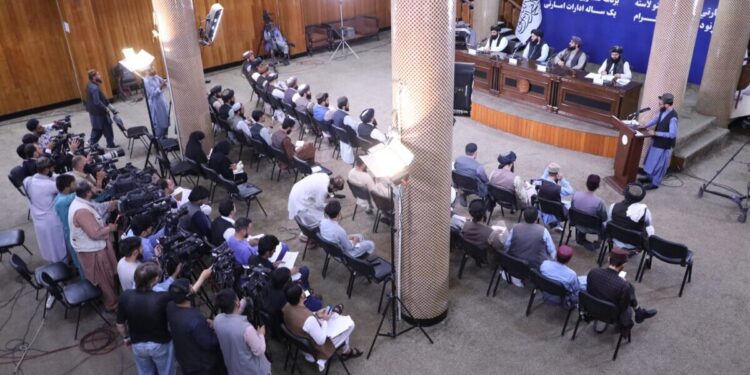The Taliban have ordered all domestic media outlets to stop broadcasting political programs immediately. The directive was issued by the Taliban’s intelligence agency and the Ministry of Information and Culture. Sources confirmed the order on Thursday, stating that the ban will remain in effect until further notice.
Media Executives to Meet Taliban Officials
Media executives are scheduled to meet Taliban officials on Saturday to discuss the restrictions. The order has raised concerns among press freedom advocates. The Afghanistan Journalists Center warned that this move is another step in the Taliban’s increasing crackdown on independent media.
The decision coincides with International Radio Day, observed worldwide on February 13. The timing has further highlighted concerns over press freedom in Afghanistan.
Tighter Media Restrictions Since Taliban Takeover
Since returning to power in August 2021, the Taliban have imposed strict controls on media organizations. Over the past three years, they have issued at least 22 directives regulating radio broadcasts. The latest ban marks another escalation in suppressing political content.
On Thursday, a media watchdog expressed concerns over the severe restrictions imposed on radio stations. The Taliban’s media policies have significantly affected independent journalism in Afghanistan.
Closure of Media Outlets in 2024
Reporters Without Borders (RSF) reported that at least 12 media outlets have been shut down in 2024 alone. These closures include both public and private media organizations. Many journalists have been forced into self-censorship or have fled the country due to increased threats.
International organizations have repeatedly condemned the Taliban’s treatment of the press. Despite global criticism, restrictions continue to intensify, limiting access to information.
Growing Concerns Over Press Freedom
Press freedom advocates say these restrictions further isolate Afghanistan from the international community. Independent media has played a crucial role in informing the Afghan public, but these new rules threaten that role.
The Taliban have yet to issue an official statement explaining the reasons for the ban. However, their actions indicate an effort to control narratives and suppress dissenting voices.
The upcoming meeting between media executives and Taliban officials will determine whether there is any possibility of reversing the ban. Until then, domestic media outlets remain under severe pressure, struggling to operate under strict limitations.
Related Stories:
Afghan Taliban’s Absurd’ New Media Laws Imposing Media Ban On Images Of Living Things
Taliban’s Window Ban: Enforcing Gender Apartheid, Erasing Afghan Women
















